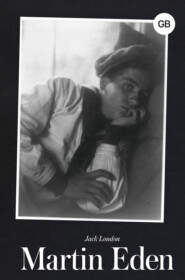По всем вопросам обращайтесь на: info@litportal.ru
(©) 2003-2024.
✖
The Cruise of the Dazzler
Настройки чтения
Размер шрифта
Высота строк
Поля
"Fight! fight!" the gang began to howl again.
"And it 's me that 'll see fair play," said a man's heavy voice.
All eyes were instantly turned upon the man who had approached unseen and made this announcement. By the electric light, shining brightly on them from the corner, they made him out to be a big, muscular fellow, clad in a working-man's garments. His feet were incased in heavy brogans, a narrow strap of black leather held his overalls about his waist, and a black and greasy cap was on his head. His face was grimed with coal-dust, and a coarse blue shirt, open at the neck, revealed a wide throat and massive chest.
"An' who 're you?" Simpson snarled, angry at the interruption.
"None of yer business," the newcomer retorted tartly. "But, if it 'll do you any good, I 'm a fireman on the China steamers, and, as I said, I 'm goin' to see fair play. That 's my business. Your business is to give fair play. So pitch in, and don't be all night about it."
The three boys were as pleased by the appearance of the fireman as Simpson and his followers were displeased. They conferred together for several minutes, when Simpson deposited the bundle of kites in the arms of one of his gang and stepped forward.
"Come on, then," he said, at the same time pulling off his coat.
Joe handed his to Fred, and sprang toward Brick. They put up their fists and faced each other. Almost instantly Simpson drove in a fierce blow and ducked cleverly away and out of reach of the blow which Joe returned. Joe felt a sudden respect for the abilities of his antagonist, but the only effect upon him was to arouse all the doggedness of his nature and make him utterly determined to win.
Awed by the presence of the fireman, Simpson's followers confined themselves to cheering Brick and jeering Joe. The two boys circled round and round, attacking, feinting, and guarding, and now one and then the other getting in a telling blow. Their positions were in marked contrast. Joe stood erect, planted solidly on his feet, with legs wide apart and head up. On the other hand, Simpson crouched till his head was nearly lost between his shoulders, and all the while he was in constant motion, leaping and springing and manoeuvering in the execution of a score or more of tricks quite new and strange to Joe.
At the end of a quarter of an hour, both were very tired, though Joe was much fresher. Tobacco, ill food, and unhealthy living were telling on the gang-leader, who was panting and sobbing for breath. Though at first (and because of superior skill) he had severely punished Joe, he was now weak and his blows were without force. Growing desperate, he adopted what might be called not an unfair but a mean method of attack: he would manoeuver, leap in and strike swiftly, and then, ducking forward, fall to the ground at Joe's feet. Joe could not strike him while he was down, and so would step back until he could get on his feet again, when the thing would be repeated.
But Joe grew tired of this, and prepared for him. Timing his blow with Simpson's attack, he delivered it just as Simpson was ducking forward to fall. Simpson fell, but he fell over on one side, whither he had been driven by the impact of Joe's fist upon his head. He rolled over and got half-way to his feet, where he remained, crying and gasping. His followers called upon him to get up, and he tried once or twice, but was too exhausted and stunned.
"I give in," he said. "I 'm licked."
The gang had become silent and depressed at its leader's defeat.
Joe stepped forward.
"I 'll trouble you for those kites," he said to the boy who was holding them.
"Oh, I dunno," said another member of the gang, shoving in between Joe and his property. His hair was also a vivid red. "You 've got to lick me before you kin have 'em."
"I don't see that," Joe said bluntly. "I 've fought and I 've won, and there 's nothing more to it."
"Oh, yes, there is," said the other. "I 'm 'Sorrel-top' Simpson. Brick 's my brother. See?"
And so, in this fashion, Joe learned another custom of the Pit People of which he had been ignorant.
"All right," he said, his fighting blood more fully aroused than ever by the unjustness of the proceeding. "Come on."
Sorrel-top Simpson, a year younger than his brother, proved to be a most unfair fighter, and the good-natured fireman was compelled to interfere several times before the second of the Simpson clan lay on the ground and acknowledged defeat.
This time Joe reached for his kites without the slightest doubt that he was to get them. But still another lad stepped in between him and his property. The telltale hair, vividly red, sprouted likewise on this lad's head, and Joe knew him at once for what he was, another member of the Simpson clan. He was a younger edition of his brothers, somewhat less heavily built, with a face covered with a vast quantity of freckles, which showed plainly under the electric light.
"You don't git them there kites till you git me," he challenged in a piping little voice. "I 'm 'Reddy' Simpson, an' you ain't licked the fambly till you 've licked me."
The gang cheered admiringly, and Reddy stripped a tattered jacket preparatory for the fray.
"Git ready," he said to Joe.
Joe's knuckles were torn, his nose was bleeding, his lip was cut and swollen, while his shirt had been ripped down from throat to waist. Further, he was tired, and breathing hard.
"How many more are there of you Simpsons?" he asked. "I 've got to get home, and if your family 's much larger this thing is liable to keep on all night."
"I 'm the last an' the best," Reddy replied. "You gits me an' you gits the kites. Sure."
"All right," Joe sighed. "Come on."
While the youngest of the clan lacked the strength and skill of his elders, he made up for it by a wildcat manner of fighting that taxed Joe severely. Time and again it seemed to him that he must give in to the little whirlwind; but each time he pulled himself together and went doggedly on. For he felt that he was fighting for principle, as his forefathers had fought for principle; also, it seemed to him that the honor of the Hill was at stake, and that he, as its representative, could do nothing less than his very best.
So he held on and managed to endure his opponent's swift and continuous rushes till that young and less experienced person at last wore himself out with his own exertions, and from the ground confessed that, for the first time in its history, the "Simpson fambly was beat."
CHAPTER IV
THE BITER BITTEN
But life in the Pit at best was a precarious affair, as the three Hill-dwellers were quickly to learn. Before Joe could even possess himself of his kites, his astonished eyes were greeted with the spectacle of all his enemies, the fireman included, taking to their heels in wild flight. As the little girls and urchins had melted away before the Simpson gang, so was melting away the Simpson gang before some new and correspondingly awe-inspiring group of predatory creatures.
Joe heard terrified cries of "Fish gang!" "Fish gang!" from those who fled, and he would have fled himself from this new danger, only he was breathless from his last encounter, and knew the impossibility of escaping whatever threatened. Fred and Charley felt mighty longings to run away from a danger great enough to frighten the redoubtable Simpson gang and the valorous fireman, but they could not desert their comrade.
Dark forms broke into the vacant lot, some surrounding the boys and others dashing after the fugitives. That the laggards were overtaken was evidenced by the cries of distress that went up, and when later the pursuers returned, they brought with them the luckless and snarling Brick, still clinging fast to the bundle of kites.
Joe looked curiously at this latest band of marauders. They were young men of from seventeen and eighteen to twenty-three and – four years of age, and bore the unmistakable stamp of the hoodlum class. There were vicious faces among them – faces so vicious as to make Joe's flesh creep as he looked at them. A couple grasped him tightly by the arms, and Fred and Charley were similarly held captive.
"Look here, you," said one who spoke with the authority of leader, "we 've got to inquire into this. Wot 's be'n goin' on here? Wot 're you up to, Red-head? Wot you be'n doin'?"
"Ain't be'n doin' nothin'," Simpson whined.
"Looks like it." The leader turned up Brick's face to the electric light. "Who 's been paintin' you up like that?" he demanded.
Brick pointed at Joe, who was forthwith dragged to the front.
"Wot was you scrappin' about?"
"Kites – my kites," Joe spoke up boldly. "That fellow tried to take them away from me. He 's got them under his arm now."
"Oh, he has, has he? Look here, you Brick, we don't put up with stealin' in this territory. See? You never rightly owned nothin'. Come, fork over the kites. Last call."
The leader tightened his grasp threateningly, and Simpson, weeping tears of rage, surrendered the plunder.
"Wot yer got under yer arm?" the leader demanded abruptly of Fred, at the same time jerking out the bundle. "More kites, eh? Reg'lar kite-factory gone and got itself lost," he remarked finally, when he had appropriated Charley's bundle. "Now, wot I wants to know is wot we 're goin' to do to you t'ree chaps?" he continued in a judicial tone.
"What for?" Joe demanded hotly. "For being robbed of our kites?"
"Not at all, not at all," the leader responded politely; "but for luggin' kites round these quarters an' causin' all this unseemly disturbance. It 's disgraceful; that 's wot it is – disgraceful."
At this juncture, when the Hill-dwellers were the center of attraction, Brick suddenly wormed out of his jacket, squirmed away from his captors, and dashed across the lot to the slip for which he had been originally headed when overtaken by Joe. Two or three of the gang shot over the fence after him in noisy pursuit. There was much barking and howling of back-yard dogs and clattering of shoes over sheds and boxes. Then there came a splashing of water, as though a barrel of it had been precipitated to the ground. Several minutes later the pursuers returned, very sheepish and very wet from the deluge presented them by the wily Brick, whose voice, high up in the air from some friendly housetop, could be heard defiantly jeering them.
This event apparently disconcerted the leader of the gang, and just as he turned to Joe and Fred and Charley, a long and peculiar whistle came to their ears from the street – the warning signal, evidently, of a scout posted to keep a lookout. The next moment the scout himself came flying back to the main body, which was already beginning to retreat.

















